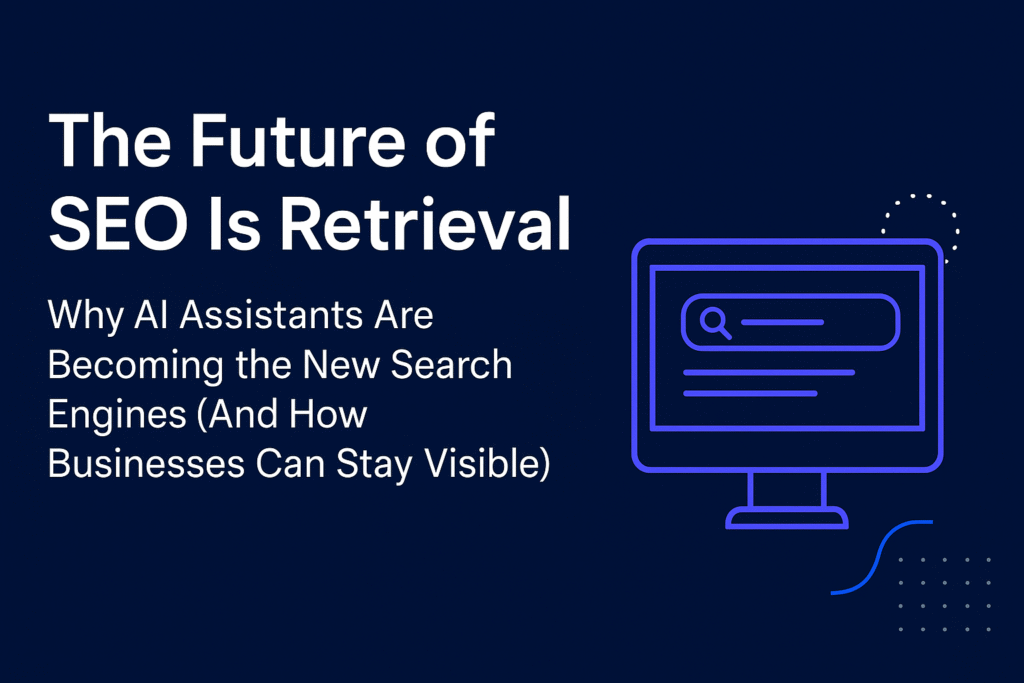When most people think about SEO, they imagine ranking on Google’s first page, writing long articles, and chasing backlinks. For a decade, that was the game. But in 2023, I experienced something that forced me to rethink everything I knew about search: I lost my job as an SEO specialist.
At the same time, the industry was shifting beneath our feet. Google’s AI Overviews were rolling out, ChatGPT was becoming a search engine in real time, and brands were watching their organic traffic suddenly flatten or decline.
What felt like a personal setback became the moment that pushed me into understanding a much bigger shift: SEO was no longer about ranking. It was about being retrieved. It was about being chosen as an authoritative source in systems that no longer think in blue links, but in answers, entities, and semantic confidence.
That realisation became the foundation of my agency, Search Engine Star, and the reason I’ve dedicated my work to helping businesses transition from old-school SEO to AI Search Optimisation. In this article, I’ll share what I discovered, why the industry is changing faster than most people realise, and how businesses can build content that AI assistants trust enough to retrieve.
How Losing My Job Became My Entry Point into AI Search
In late 2023, I found myself unemployed after my SEO role was unexpectedly terminated. It wasn’t because I wasn’t delivering results, but because the company was trying to pivot and restructure during one of the most unpredictable periods in search history.
Like most SEOs, I turned to job boards, freelance marketplaces, and LinkedIn. The competition was overwhelming. Roles that once required traditional SEO skills were now asking for AI content experience, LLM familiarity, or prompting knowledge. The ground had shifted.
This forced me into deep study. I began testing how ChatGPT sourced answers. I studied AI Overviews, Perplexity citations, TikTok search patterns, and semantic entity extraction. I realised something most people in SEO weren’t acknowledging: AI assistants don’t retrieve content because it ranks. They retrieve content because it’s structured, verified, and contextually rich enough for an LLM to trust.
That insight became the beginning of Search Engine Star, and ultimately redefined my career.
The Reality: SEO Has Become Retrieval Optimisation
AI search is not a small update. It is not “just another feature.” It is a total redesign of how information is delivered.
Here is the truth most businesses are still underestimating:
- AI Overviews pull answers from multiple sources, not just the top-ranking page
- ChatGPT assembles responses using entity relationships and semantic scoring
- Perplexity retrieves short, high-confidence sources, not long, keyword-heavy blogs
- TikTok surfaces answers based on watch time, clarity, and niche authority
- Meta AI summarises articles using retrieval-augmented generation
Search is no longer about where you rank. It’s about whether you are retrievable.
In AI search, content must be:
- Answer-ready
- Entity-rich
- Schema-verified
- Concise yet information-dense
- Supported by brand authority signals
If your content fails in any of these areas, AI assistants may completely ignore your site—even if you rank on page one.
The New SEO Stack: What AI Search Actually Looks For
Through client work, testing, and building frameworks at Search Engine Star, I’ve identified the four biggest components that influence AI retrieval.
1. Answer Blocks
AI models prefer content that surfaces a direct, clear answer at the top of the page.
This means:
- 2–3 sentence solution summary
- Clear definitions
- Immediate context-setting
Long introductions no longer work. AI wants clarity, not suspense.
2. Entity Mapping
AI retrieval works on relationships, not keywords.
If your content fails to connect entities (people, places, processes, brands, products), you lose semantic clarity.
This is why schema markup matters now more than ever.
3. Evidence-Based Claims
LLMs fact-check using cross-web verification.
Content that includes:
- cited statistics
- industry benchmarks
- referenced studies
- real examples
gets retrieved more often.
4. Retrieval-Friendly Formatting
AI search systems prefer information that fits neatly into:
- bullet points
- step-by-step frameworks
- tables
- definitions
- FAQs
These formats are easy for AI to parse and summarise.
This is “AI Search Optimisation” in practice — and it is rapidly becoming the new baseline.
Why Traditional SEO Content Is Becoming Less Visible
There are three major problems with traditional SEO content in today’s AI search ecosystem.
Problem 1: It’s too long
Most 2,000+ word articles were written for Google’s long-form bias.
AI assistants do not reward length. They reward clarity.
Problem 2: It’s too keyword-focused
LLMs do not care about keyword repetition.
They care about topical certainty and contextual depth.
Problem 3: It’s not formatted for retrieval
Most articles are:
- not structured in answer-ready blocks
- missing schema
- lacking supporting evidence
- heavy in fluff and filler
This makes them unreliable for AI summarisation, and therefore rarely cited.
How Businesses Can Prepare for AI Search Today
The good news is that businesses can adapt quickly with the right AI search ranking strategy.
Here is the process we use at Search Engine Star.
1. Create an AI-First Content Structure
Every page should begin with:
- A short, concise answer
- A quick definition
- A snapshot of key facts
Followed by expanded insights.
2. Build Entity-Rich Content
Add supporting entities such as:
- brand names
- industry tools
- related topics
- geographic references
- product variations
This helps AI models understand the context of your content.
3. Use Schema for Verification
FAQ, HowTo, Article, and Product schema now act as reliability markers for AI systems.
Schema doesn’t guarantee retrieval, but it increases confidence.
4. Add Evidence
Include:
- statistics
- quotes from industry sources
- case studies
- comparison tables
The more verifiable your content is, the more likely AI will trust it.
5. Maintain Topical Depth Across Clusters
AI search engines prefer brands that show domain authority, not just page-level authority.
Build clusters such as:
- AI Search Optimisation
- eCommerce SEO
- Local SEO
- Content Strategy
This strengthens your entity footprint across the web.
What I Learned from Rebuilding My Career
When I first shifted into AI Search Optimisation, I felt like the industry was collapsing. What I realised instead was that it was evolving, and those who adapt early will lead the next decade.
Here are the five biggest lessons I’ve learned from transitioning into the AI search era:
Lesson 1: Reinvention is forced, not chosen
Losing my job pushed me into studying AI search deeper than I ever would have on my own.
That setback became the foundation of Search Engine Star.
Lesson 2: Expertise now matters more than content length
Businesses must shift from creating long blogs to creating authoritative, verifiable, structured content.
Lesson 3: AI search rewards clarity, not creativity
Your content must be straightforward, factual, and structured.
AI assistants cannot interpret poetic writing.
Lesson 4: Modern SEO requires multidisciplinary skills
Understanding LLMs, prompt engineering, schema, semantic search, and structured data is no longer optional.
Lesson 5: The brands that adapt early will dominate
AI search is still in its early stages. The window to become a leader is wide open for now — but the gap will close fast.
Why I Take AI Search So Seriously
For me, AI search isn’t just a trend or a new ranking factor. It’s a complete shift in how humans access information. We’re moving into a world where:
- users ask questions instead of typing keywords
- AI assistants summarise the web for them
- answers are chosen instantly
- brand visibility is determined by accuracy and authority, not placement
In this new reality, businesses that rely on traditional SEO alone will struggle.
But those that adapt to retrieval-based visibility will outperform their competitors with less content and fewer resources.
That’s why I founded Search Engine Star.
That’s why I talk about AI search every day.
And that’s why I help businesses prepare for a future where search is no longer about ranking — but about being the source AI trusts the most.
Conclusion: The Next Era of SEO Has Already Begun
AI search is evolving faster than most organisations can keep up with. Whether it’s Google AI Overviews, ChatGPT Search, Perplexity, TikTok search, or Meta AI, the message is the same: the future of visibility belongs to structured, verifiable, expert-driven content.
SEO is still alive.
But it has changed form.
We are entering the era of Retrieval Optimisation — where your brand’s visibility depends not on how often you appear in search results, but on how reliably AI can retrieve your information.
Businesses that begin adapting now will lead their industries within the next two years. Those that wait will struggle to understand why their organic traffic is declining, even when they “rank.”
The future of SEO is retrieval.
And the time to prepare for it is now.

Joseph is an SEO Specialist and the founder of Search Engine Star, a results-driven SEO agency dedicated to helping businesses boost visibility, rank higher, and grow through smart search strategies. With years of experience in eCommerce SEO, AI-driven optimization, and SEO copywriting, Joseph has helped brands increase organic traffic and secure top spots in Google’s AI Overviews and featured snippets.

